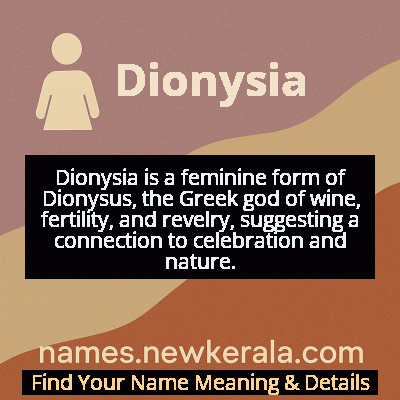Dionysia Name Meaning & Details
Origin, Popularity, Numerology Analysis & Name Meaning of Dionysia
Discover the origin, meaning, and cultural significance of the name DIONYSIA. Delve into its historical roots and explore the lasting impact it has had on communities and traditions.
Name
Dionysia
Gender
Female
Origin
Greek
Lucky Number
6
Meaning of the Name - Dionysia
Dionysia is a feminine form of Dionysus, the Greek god of wine, fertility, and revelry, suggesting a connection to celebration and nature.
Dionysia - Complete Numerology Analysis
Your Numerology Number
Based on Pythagorean Numerology System
Ruling Planet
Venus
Positive Nature
Harmonious, responsible, caring, and artistic.
Negative Traits
Overly idealistic, superficial, possessive, or jealous.
Lucky Colours
Pink, turquoise.
Lucky Days
Friday.
Lucky Stones
Diamond, turquoise.
Harmony Numbers
2, 3, 9.
Best Suited Professions
Artists, musicians, teachers, healthcare workers.
What People Like About You
Warmth, nurturing nature, artistic flair.
Famous People Named Dionysia
Dionysia of Alexandria
Early Christian Martyr
Martyred during Roman persecution, venerated as saint
Dionysia Gómez
Argentine Actress
Prominent theater and film actress in mid-20th century Argentine cinema
Dionysia Melpomene
Ancient Greek Poet
Alexandrian school poet known for feminine lyrical compositions
Name Variations & International Equivalents
Click on blue names to explore their detailed meanings. Gray names with will be available soon.
Cultural & Historical Significance
The name also reflects the complex role of women in Dionysian worship, where female followers (maenads) participated in ecstatic rituals that temporarily overturned conventional gender roles and social hierarchies, representing both liberation and dangerous excess. Throughout history, the name has maintained its connection to artistic and theatrical traditions, often chosen by families with interests in classical education or performing arts. In modern contexts, it serves as a bridge to ancient cultural practices while accommodating contemporary naming conventions.
Extended Personality Analysis
Women named Dionysia are often perceived as creative, expressive, and emotionally vibrant individuals. They tend to possess a natural charisma and artistic sensibility, frequently excelling in creative fields like theater, music, writing, or visual arts. Their personality often reflects the dual nature of their namesake god - capable of great joy and celebration but also depth and transformation. They typically have strong social skills and enjoy bringing people together, much like the communal aspects of Dionysian festivals.
However, they may also struggle with balancing their emotional intensity and occasional tendencies toward extremes. Their creative energy often makes them natural leaders in artistic communities, while their intuitive understanding of human emotion allows them to connect deeply with others. The Dionysian influence may manifest as a love for celebration, but also a profound understanding of life's cyclical nature - joy and sorrow, creation and destruction. These women often possess a magnetic quality that draws others to them, combined with a philosophical depth that surprises those who initially see only their celebratory nature.
Modern Usage & Popularity
In contemporary naming practices, Dionysia remains a distinctive choice that appeals to parents seeking classical roots with artistic connotations. While not appearing on most popular name charts, it has experienced a modest revival particularly among families with Greek heritage or those interested in classical mythology. The name is most commonly used in Greece and Cypriot communities, where it maintains cultural authenticity, but has also gained some traction internationally among academics and artists. Its rarity makes it an appealing option for parents wanting a unique yet historically significant name. Recent trends show increased interest in mythological names, potentially signaling growing appreciation for Dionysia. The name's connection to creativity, celebration, and transformation resonates with modern values of self-expression and emotional authenticity, making it particularly appealing to parents in creative fields or those valuing classical education.
Symbolic & Spiritual Meanings
Symbolically, Dionysia represents the profound interconnectedness of life's dualities - joy and sorrow, creation and destruction, civilization and wild nature. Like the grape harvest that yields both ecstatic wine and the sobering reality of labor, the name embodies transformation through experience. It symbolizes the breaking of conventional boundaries and the liberation of creative and emotional expression, reflecting the Dionysian principle that true wisdom comes from embracing life in its entirety. The name carries deep connotations of fertility cycles and natural regeneration, connecting to the agricultural origins of Dionysian worship. Metaphorically, it represents the human capacity for ecstatic experience and artistic creation born from confronting life's complexities. In psychological terms, Dionysia symbolizes the integration of shadow aspects and the transformative power that emerges when we acknowledge our full emotional spectrum, serving as a timeless reminder that authentic living requires embracing both light and darkness.

